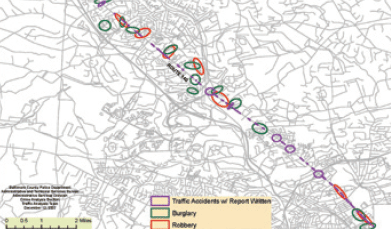Data-Driven Approaches to Crime and Traffic Safety Training

Data-Driven Approaches to Crime and Traffic Safety (DDACTS) integrates location-based crime and traffic data to establish effective and efficient methods for deploying law enforcement and other resources. Using GIS mapping to identify areas that have high incidences of crime and crashes, DDACTS uses traffic safety strategies that play a dual role in fighting crime and reducing crashes and traffic violations. Drawing on the deterrent of highly visible traffic engagement and the knowledge that crime often involves the use of motor vehicles, the goal of DDACTS is to reduce the incidence of crime, crashes, and traffic violations across the country. This has proven to be an effective, predictive, location-based policing approach to crime and traffic safety that delivers law enforcement services at the right place and at the right time.
DDACTS Operational Guidelines: Data-Driven Approaches to Crime and Traffic Safety (DDACTS 2.0)
For Resource Materials, go to the DDACTS Resources page.
For information on DDACTS workshops, go to the DDACTS Agency Workshop page.
Data Collection
DDACTS relies on prompt collection and analysis of crash and crime data to provide actionable reports that inform tactical and strategic decisions of a law enforcement agency.
 Some of the agencies currently participating are: Harris County, Texas Sheriff's Office; El Paso, Texas Police Department; Weatherford, Texas Police Department; Denver, Colorado Police; Evesham, New Jersey Police Department; Kansas City, Kansas Police Department; Pearland, Texas Police Department; Shawnee, Kansas Police Department; Schenectady, New York Police Department; Denver, Colorado Police Department; Loveland, Colorado Police Department; Roanoke County, Virginia Police Department; Florence County, South Carolina Sheriff's Office; St. Charles, Missouri Police Department; Greenville, North Carolina Police Department; Casper, Wyoming Police Department.
Some of the agencies currently participating are: Harris County, Texas Sheriff's Office; El Paso, Texas Police Department; Weatherford, Texas Police Department; Denver, Colorado Police; Evesham, New Jersey Police Department; Kansas City, Kansas Police Department; Pearland, Texas Police Department; Shawnee, Kansas Police Department; Schenectady, New York Police Department; Denver, Colorado Police Department; Loveland, Colorado Police Department; Roanoke County, Virginia Police Department; Florence County, South Carolina Sheriff's Office; St. Charles, Missouri Police Department; Greenville, North Carolina Police Department; Casper, Wyoming Police Department.
Technical Assistance and Workshops
IADLEST provides project management and workshop implementations for DDACTS. The National Highway Transportation Safety Administration, the Bureau of Justice Assistance, and the National Institute of Justice are collaborating to promote and support DDACTS.
DDACTS 2.0 Webinar Training Series
IADLEST, in cooperation with the National Highway Transportation Safety Administration, is happy to present this free 8-part online training series on DDACTS 2.0. The segments will provide attendees an overview and explanation of the model and its seven guiding principles. It also demonstrates how to effectively use data collection and analysis to manage and deploy strategic resources to decrease crashes and crime in agencies throughout the country. The series will be presented as a live webinar each month beginning February 18, 2021, with the recordings available afterward. Each segment is 60 minutes in length.
Webinar Registration and Course Information
Multi-Part Online Analytical Training Series
This free training series is broken into 60 -90 minutes segments and is designed for new and seasoned analysts to learn key primary skills needed to practice effective and efficient analytical processes. The series explores the benefits of data-driven strategies, the process of connecting databases and analyzing in Microsoft Access®, applying statistical significance techniques in Microsoft Excel®, and developing key mapping and analytical skills in ArcGIS.
This training is part of NHTSA’s effort for a nation-wide implementation of the Nationally Recognized Data-Driven Approaches to Crime and Traffic Safety (DDACTS). The courses are Nationally certified through the International Association of Directors of Law Enforcement Standards and Training (IADLEST) and may be eligible to submit for POST credit. Participants who successfully complete ALL 13 parts will earn a Certified DDACTS Analyst certification and course credit from the International Association of Crime Analysts (IACA).
The training series can be found on the First Forward web page by going to First Forward and searching "Market Place" for all training or you can access each class by utilizing the links below:
A Training Reference Manual for Parts 1 -10 can be downloaded by going to:
Automation A-Z Analytical Training Series
The International Association of Directors of Law Enforcement Standards and Training (IADLEST), in cooperation with the National Highway Transportation Safety Administration, is happy to present the free 3-part online training series “Automation A - Z” series with accompanying Analyst Library. These three segments focus on the principles relating to automation strategies for law enforcement analysts. In addition, the first Analyst Library created will be leveraged to augment the training. Analysts will learn step-by-step how to automate their statistical processes, improve efficiencies, save hours, reduce their frustration with repetitive tasks, and create time for a proactive crash and crime analysis. The series will be presented as live webinars on July 28th, August 18th, and September 8th, with the recordings available afterward. Each segment is 60 minutes in length. Students will have access to the entire Analyst Library upon registration.
Webinar Registration and Library Information
Analyst Mastermind Webinar Series
In this webinar series crime and crash data analyst will share with you advanced techniques and best practices that will help your department reduce traffic crashes and crime in your jurisdiction. There is no cost for participating.
Scheduled dates in 2020 beginning at 2:00pm (Eastern). Note: The February 19th session was a Chief's Roundtable answering questions about how to promote buy-in for evidence-based policing in your department.
BJA Building Analytical Capacity: Crime and Crash Analysis Webinar Recordings
View recordings of twenty webinars produced by IADLEST in cooperation with the Bureau of Justice Assistance covering all aspects of data analysis. Find out how it can help your department significantly reduce the number of traffic crashes and crime incidents in your area.
Building Analytical Capacity
These free, recorded webinars cover the following topics:
Understanding Hot Spot Mapping for Police Executives
Getting the Most Out of Crime Analysis
Crime Analysis Tactics, Strategies, and Special Operations
Improving Data Quality for Crime Analysis
Strategic Crime Analysis: Reducing Hot Spots & Solving Problems
Tactical Crime Analysis: Stopping Emerging Patterns of Crime
Using Analysis to Support an Effective CompStat Process
People, Places Patterns and Problems: A Foundation for Crime Analysis
Tasking the Collection and Analysis of Intelligence to Inform Decision Making
12 Questions Executives Should Ask About Their Crime Analysis Capabilities
7 Key Tips on Effectively Implementing Crime Analysis in Your Department
Crime Analysis for Organized Retail Theft
Professional Development in Crime Analysis
Antelope Valley Crime Fighting Initiative: A Case Study
The 4P Approach: A Foundation for Crime Analysis and Proactive Policing
Three Critical Steps for Law Enforcement Analysts to Create a Road Map to Success
Improving Metrics in Police Agencies
Using Analysis to Support Gang Enforcement
Finding the Right Analyst for the Job
The Benefits of Direct Data Access
For further information about all DDACTS programs email PeggySchaefer@iadlest.org.